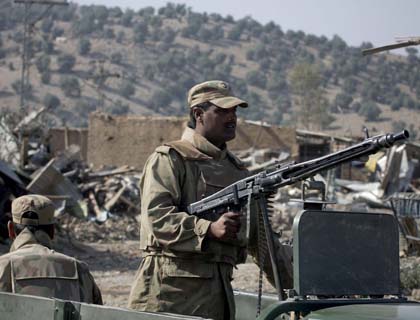The death of around 35 Pakistani security forces in a Taliban attack on security posts in Chitral district of Pakistan's Khyber Pakhtunkhwa province has once again given birth to fears that the situation in border areas is becoming increasingly volatile. Allegedly, the militants had crossed the border from Afghanistan into Pakistan. In the past, cross-border attacks involving militants on both sides of the border had been reported.
In some instances, militants have indeed crossed into Pakistan from the Afghan side of the border to mount their attacks. Anyway, this episode, unfortunately, proves once again that both governments of Afghanistan and Pakistan have a tough challenge in their hands; to work together constructively for the purpose of countering the rising tide of violence and militancy in the Af-Pak border regions.
Security and stability in the wilderness of Af-Pak border regions is much like a glass ceiling, once broken putting it back together would require years and countless lives and sacrifices on the part of the government to restore peace and stability. The population and communities in border areas, especially in the tribal areas, are prone and vulnerable to the machinations of the militant groups including the Tahrik-e Taliban Pakistan (TTP).
Once the fragile stability is torn away, restoring order would be extremely difficult if not impossible. There have been a multitude of militant groups that have mushroomed in the tribal areas in recent years. The Pakistani government has committed tremendous resources to uprooting these groups since 2001. While many of these groups operate under the umbrella of Tahrik-e Taliban Pakistan, many others are self-styled militant groups whose origins and sources of funding and resources are an intriguing mystery even to the government of Pakistan.
The United Nations Security Council's recent decision to put the Tahrik-e Taliban Pakistan on its anti-terrorism sanctions list is a step to be welcomed. The TTP has left no secret of its intentions to wage a full-fledged war on the government of Pakistan.
The Pakistani security establishment including the Inter-Services Intelligence or ISI, have been embroiled in a war of sorts with the TTP and other militant groups operating out of the tribal areas. The fact is that the Pakistani government, its military and the Inter-Services Intelligence have all made great sacrifices in recent years in the cause of cleansing the tribal areas of militant activity.
The case of Colonel Imam is perhaps the most telling example of how the Pakistani government and its armed forces continue to make sacrifices. Colonel Imam, as a veteran officer in the Inter-Services Intelligence, was instrumental in the agency's war against the spread of terrorism, militancy and lawlessness in the tribal areas. He was kidnapped and later executed in January of 2011 on direct orders and in the presence of Hakimullah Mehsud, the chief of TTP.
What is unfortunate is that the Dari language media in Afghanistan, in their sensational drive to attract viewers and appease to the emotions of the public, paint a draconian and exaggerated picture of the Inter-Services Intelligence and the Pakistani government. While such sensational coverage of events is a disservice to the cause of improving the relations between Afghanistan and Pakistan, they are also self-defeatist scapegoat of others.
The fact that militants based on the Afghan side of the border have attacked Pakistani posts across the border points to the evolving situation in the tribal areas wherein various militant groups are moving closer to one another in coordinating their positions and activities.
This is not the first time that militants based on the Afghan side of the border have mounted attacks after crossing the porous, unprotected borderline. If anything, it also proves the point that the actual situation in the tribal areas is far from what the sensationally-nonsensical Dari language media in Afghanistan want their readers and viewers to know.
As obvious, the first step towards solving a problem is acknowledging that the problem exists in the first place. It is up to both the governments of Afghanistan and Pakistan to move unto the next level of their bilateral relations and have honest evaluation of the entire spectrum of issues and problems.
Once the political will is mustered in both capitals, it would be possible for an anti-militancy drive to be undertaken for the purpose of calming down the increasingly restive situation in the border regions.
The volatile situation in Af-Pak border regions is a particularly urgent issue that requires the attention of both the governments of Afghanistan and Pakistan. Breaking down the structures of militancy and terrorism in these regions would certainly require the combined efforts of not only the governments of Pakistan and the United States but also those of Afghanistan and the international coalition based in Afghanistan.
What is worrying is the potential and danger that exists for the creation of a broader and more dangerous coalition of militant groups that would involve both Afghan and Pakistani Taliban and many other smaller militant outfits.
Both the governments in Kabul and Islamabad need to do whatever in their power to prevent such an eventuality. A broader coalition of militant groups that would straddle both sides of the border would be destabilizing to the security of the region and a security nightmare for all the countries involved.
It needs to be prevented by all means possible including, of course, greater understanding and cooperation between Afghanistan and Pakistan as two neighbors and companions that share a common destiny.
In sum, it is greater regional cooperation that would immensely benefit the region and the countries. Regional integration and closer cooperation among various countries is gaining momentum and becoming the order of day around the world.
From Latin America to South East Asia and Far East, countries are exploring ways to collaborate with one another and progressively resolve regional problems. Why not the countries in our region join hands and embark on the same path? Apart from resolving the long-standing issue of Afghanistan, this will be, eventually, in their long-term interest.

